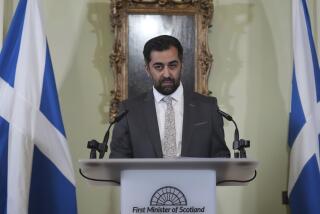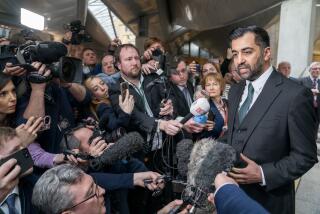Opposition to New Property Tax May Boost Regional Party : Nationalists Plan Boston Tea Party in Scotland
- Share via
EDINBURGH, Scotland — Scottish nationalists are counting on a widely unpopular reform of property taxes to lift them out of a decade-long spell in the cold.
They talk of a Scottish-style Boston Tea Party, and while the tax is not the trigger that will blast Scotland out of the United Kingdom, it is helping to stoke what the Scotsman newspaper calls “a creeping resurgence of nationalism.”
The poll tax, as the sweeping reform is known, is central to Prime Minister Margaret Thatcher’s crusade against socialism and high-spending left-wing local governments in Britain. But to many Scots, it is a highhanded edict from a thoroughly English prime minister who, they believe, has no mandate north of the border.
The Scottish National Party, which seeks outright independence for the 5.2 million Scots, is organizing a non-payment campaign. The tax also is a springboard for the more broadly based movement seeking devolution--limited self-government under an elected Scottish parliament.
Scotland’s yen to end the 281-year-old union with England has always ebbed and flowed. In the mid-1970s it was powerful enough to force a referendum on devolution, but collapsed when the referendum failed to deliver a change.
Only 2 Parliament Seats
The Scottish Nationalist Party plummeted from 11 seats in the 650-member House of Commons in London to just two. But last year it gained an extra seat, and made significant advances in the May local elections. And while it has never commanded a plurality of Scottish votes, polls consistently indicate that three-fourths of Scots favor self-government.
The 1970s surge was prompted by a sense that Scotland wasn’t getting enough revenue from its offshore oil boom.
Now it’s the poll tax, or community charge as the government calls it, which takes effect in Scotland in April and will spread to the rest of Britain a year later.
Basically it shifts local taxation from property to people, requiring each local authority to calculate its expenses, and accordingly set a uniform sum to be paid by every resident over age 18.
The government says it is fairer, simpler and makes local government more accountable, because municipalities will no longer be able to use funds collected from middle-class homeowners to finance generous social programs for those who pay little or no tax.
$340 Average Annual Tax
While replacing the property tax, the poll tax, expected to average about 260 pounds ($340) a year per adult, is in addition to the national income tax that Scots and all others in Britain must pay.
But the poll tax provides for 80% rebates for those with low incomes.
The government estimates one-third of Scots will receive rebates, but a recent opinion poll reports 70% disapproval of the poll tax, with 52% of Scots believing they will be worse off and only 18% expecting to benefit.
Judging by election results, Scotland doesn’t share Thatcher’s distaste for socialism. Her Conservative Party’s share of the Scottish vote has fallen from 50% in 1955 to 24% in last year’s general election, and the party holds only 10 Scottish seats in Parliament, compared to the socialist opposition Labor Party’s 50.
Scottish National Party lawmaker Alex Salmond calls non-payment “the greatest moral and political challenge that the Tory government has yet faced in Scotland.”
Risk of Being Upstaged
But the Labor Party risks being upstaged by the Nationalists, because it has voted not to espouse civil disobedience, fearing that it would appear unfit for government.
A dozen of Labor’s Scottish members of Parliament in London are defying party policy, and one of them, Denis Kanavan, has already been fined 50 pounds ($85) for refusing to register for the poll tax.
“It’s not good enough for Labor to tell people to stop the tax through the ballot box,” Kanavan said in an interview. “We tried that and won last year in Scotland, but we failed to stop it,”
But opinion polls indicate that only 24% of Scots are likely to refuse payment, and more than 90% have registered for the tax.
The litmus test is likely to come sometime this fall or next spring when Glasgow’s Govan district holds a by-election to fill a vacant parliamentary seat.
The polls favor victory for Labor, whose candidate, Bob Gillespie, is one of the rebels refusing to pay the tax. But anything less than a crushing Labor victory will be seen as a boost for the Scottish Nationalist Party, which is fielding Jim Sellars, a former Laborite.
The Nationalists’ Scotland-wide support has risen from 17% to 23% in recent polls, and they believe that once poll tax assessments start reaching Scottish households, that support will soar.
More to Read
Sign up for Essential California
The most important California stories and recommendations in your inbox every morning.
You may occasionally receive promotional content from the Los Angeles Times.













